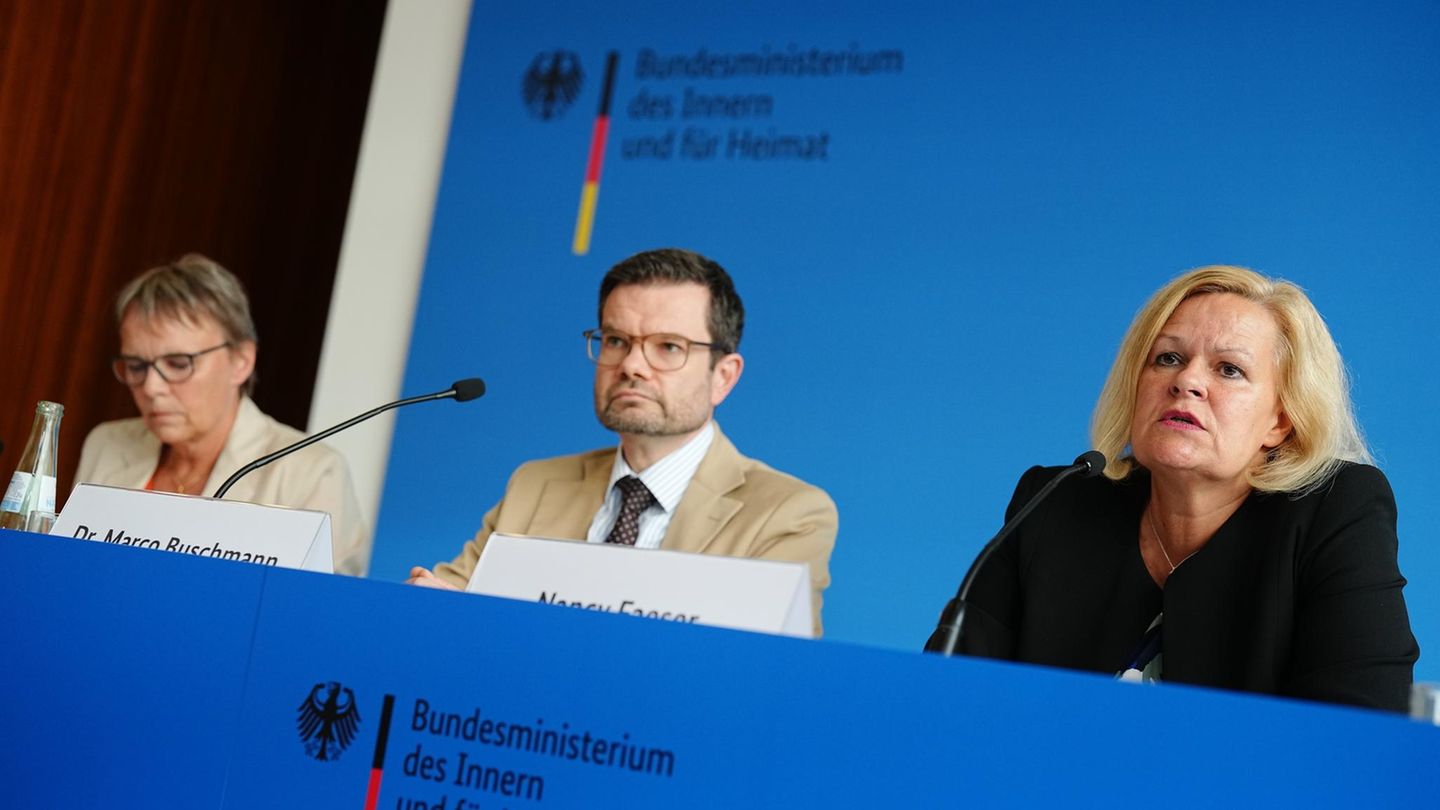The assassination attempt in Solingen has reignited the debate about asylum law. In response to the attack, the SPD, Greens and FDP have now decided on measures.
Following the deadly knife attack in Solingen, the federal government has agreed on an asylum and migration package to protect against Islamist terror, irregular immigration and to tighten gun laws. It contains “far-reaching” and “tough measures,” said Federal Minister of the Interior Nancy Faeser (SPD) at the presentation of the package together with Minister of Justice Marco Buschmann (FDP) and Anja Hajduk, State Secretary in the Ministry of Economic Affairs under Vice Chancellor Robert Habeck (Greens) in Berlin.
Tightening of gun laws
“A general ban on the use of dangerous switchblades will be introduced in the weapons law,” says the traffic light paper. Certain groups such as hunters or craftsmen will be exempted. An “absolute ban on knives” will be imposed at folk festivals, sporting events, trade fairs, exhibitions, markets or similar public events. “A general ban on knives” will also apply in the future to long-distance rail and other services, Faeser said. The federal police will be given the authority to “carry out random checks regardless of suspicion” at train stations, for example.
The states should be given the opportunity to impose a “complete ban on knives” in local transport. In addition, the requirements for a gun license should be increased to ensure that extremists do not have access to weapons and explosives.
Measures against violent Islamism
In this area, the government promises “improvements in the investigation and prevention of Islamist extremism”. To this end, the security authorities are to be given more extensive powers. Investigative authorities will therefore be given the right “to biometrically compare generally publicly accessible internet data (‘facial recognition’) in order to facilitate the identification of suspects or wanted persons”. “It is somewhat of an anachronism that this was not permitted until now,” said Hajduk. “In this respect, this is an important and extremely timely regulation that we are introducing.”
The federal government also wants to set up a “Task Force for the Prevention of Islamism from Science and Operational Practice” and continue to use the instrument of banning associations against Islamist associations.
Stricter residence rights for asylum seekers
Deportations are to be made easier by lowering the threshold for a particularly serious interest in deportation. This is to apply if a crime has been “committed using a weapon or other dangerous tool” and will also apply to young people in the future. In addition, according to Justice Minister Buschmann, those who return to their home country “without compelling reasons”, for example for a holiday, will lose their right to protection in Germany.

Totally against the Chancellor: Is Merz overdoing it with his asylum policy?
05:08 min
A task force from the federal and state governments is to help send more asylum seekers back to the EU states through which they entered the European Union under the Dublin procedure. For those asylum seekers for whom other EU states are responsible, benefits in Germany are to be reduced. Under certain conditions, they are to be “precluded from receiving any further benefits in Germany”. This is intended to increase the pressure to leave the country. The existing options for cutting benefits will be expanded accordingly. “We will ensure that all those affected are treated with human dignity,” assured Faeser. “No one will starve in Germany, nor will they sleep on the streets.”
It should also be easier for migrants to be excluded from protection in Germany if they have committed crimes. “In the future, criminalisation of smuggling and crimes with an anti-Semitic, racist, xenophobic, gender-specific, anti-sexual or other inhumane motive can also lead to exclusion from protection,” the document states.
The Federal Government also reaffirms its intention to enable deportations to Afghanistan and Syria. Intensive work will continue to be carried out on this.
Scholz wants talks with states and Union
The package of measures should now be implemented as quickly as possible, said Faeser – certainly not next year. Chancellor Olaf Scholz (SPD) also announced talks with the states and the Union as the largest opposition force on Wednesday. A working group made up of representatives from all three traffic light parties is to meet for the first time next week.
The attack in Solingen last Friday, which left three people dead and eight injured, sparked a debate about, among other things, tightening gun laws and the course of migration policy.
Note: This article has been updated several times.
Source: Stern
I have been working in the news industry for over 6 years, first as a reporter and now as an editor. I have covered politics extensively, and my work has appeared in major newspapers and online news outlets around the world. In addition to my writing, I also contribute regularly to 24 Hours World.




